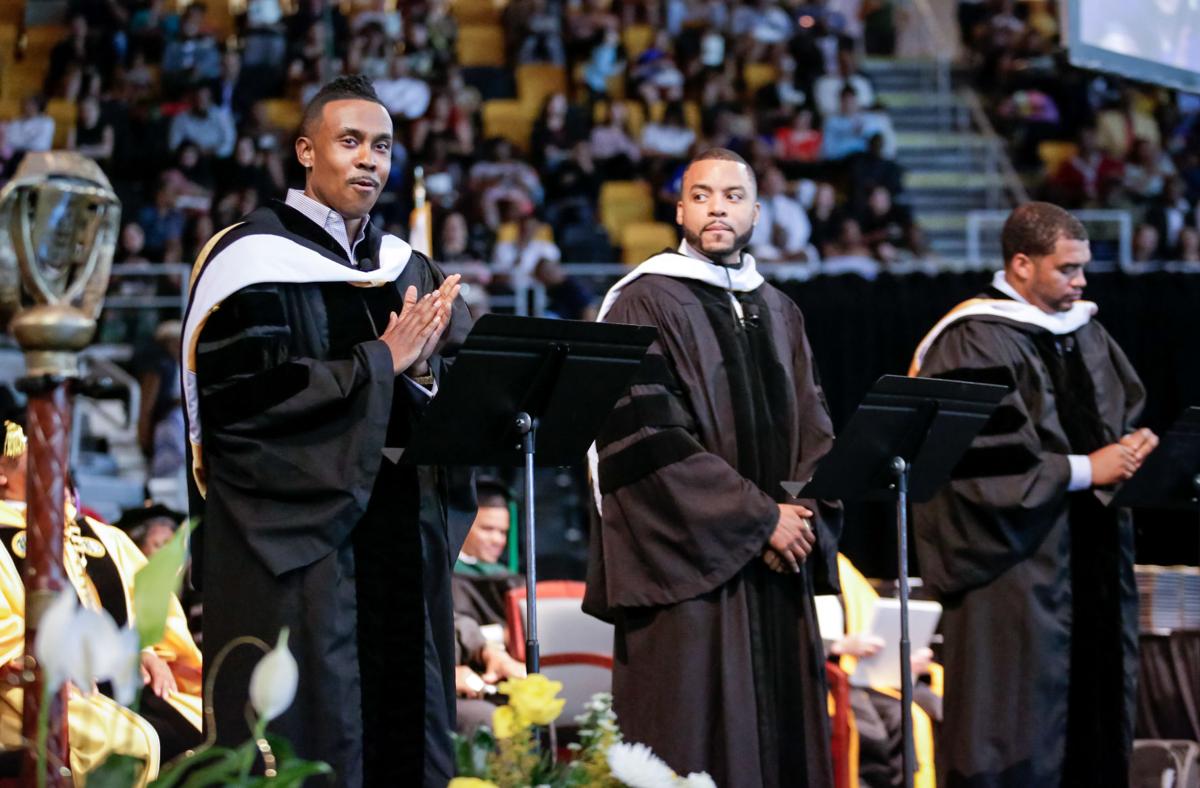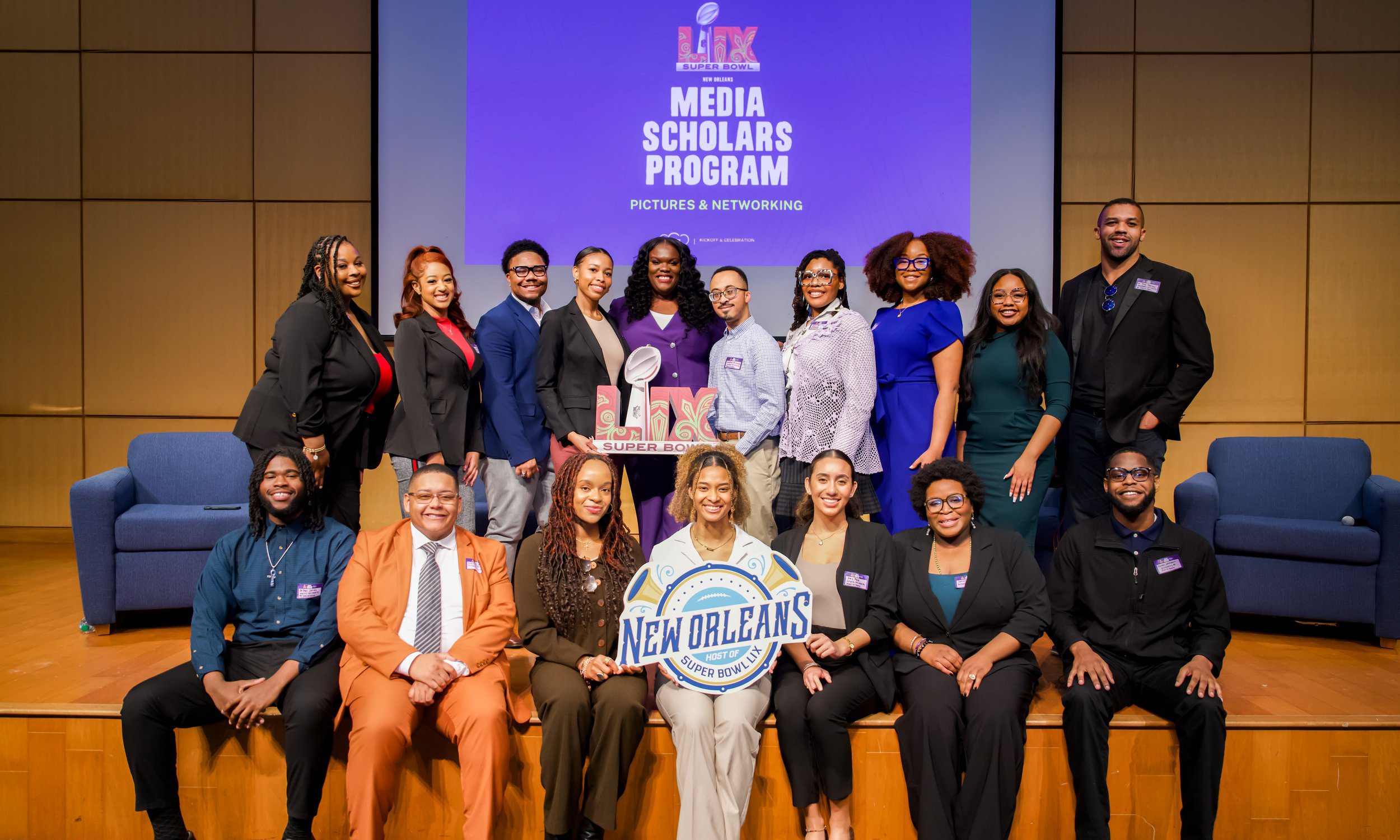As a Dearth of Black Male Doctors Persists, Xavier Continues Creating a Pipeline to Medical Fields

(from left) Doctors Pierre Johnson, Maxime Madhere, and Joseph Semien, Jr., authors of the book "Pulse of Perseverance", give the commencement address at their alma mater during Xavier University's 92nd annual ceremony. More than 10 percent of the 504 graduates earned Summa Cum Laude status.
Watch It! (Commencement Video)
Complete List of Graduates
Story by Della Hasselle
Photo by Scott Threlkeld
New Orleans Advocate
Pierre Johnson was 3 years old when he and his mother frantically ran through the streets of Chicago to escape his drug-addicted father. Maxime Madhere looked into the barrel of a gun as a high school student in Washington, D.C., when a rival robbed him at a bus stop. And Joseph Semien Jr. spent years running from the police in his Jefferson Parish neighborhood after starting to use and sell drugs.
The three young black men had the odds stacked against them. But through hard work, luck and perseverance, they made it to Xavier University, where each set on a path to achieve a seemingly impossible task: becoming a doctor.
"They laid down a blueprint during every semester of where we were, where we needed to be — even if we faltered — and what we needed to do," said Madhere, who now works as a cardiothoracic anesthesiologist at Our Lady of the Lake Regional Medical Center in Baton Rouge. "They gave us an opportunity to thrive."
Recent data from the Association of American Medical Colleges show that as the number of black men entering medical school continues to fall, Xavier yet again is at the top of the list in universities pushing back against that trend.
The small New Orleans school has more black students who go on to graduate from medical school than any other college in the country, outpacing even Ivy League campuses and huge state universities.
The association's latest data, covering 2013-2018, showed that 147 black students who attended Xavier went on to complete medical school.
Only 11 other institutions came even close to that number, graduating 100 or more African-American students who went on to finish medical school during the same period, the data show. And most were much larger schools.
Anne McCall, the school's provost of academic affairs, called Xavier's contribution to African-American men in the medical field a "mark of distinction."
"It's one of the most amazing things about Xavier," she said.
Over the weekend, during Xavier's 92nd commencement ceremony, Johnson, Madhere and Semien served as keynote speakers, giving graduates advice on how to succeed by befriending like-minded people and not allowing others to place limitations on them.
Their success as black men in medicine is all too rare.
In 2015, the latest year for which data are available, only 5.7 percent of medical school graduates throughout the country were black, according to an AAMC report, “Current Trends in Medical Education.”
The trend is also getting worse for black men.
The number of black men becoming medical students has fallen by more than 38 percent since 1978, according to another report, "An American Crisis: The Growing Absence of Black Men in Medicine and Science."
That report, compiled in 2018 by the National Academies of Sciences, Engineering and Medicine and the W. Montague Cobb Institute, a nonprofit organization that works to eliminate racial disparities in medicine, found that while more black students were entering medical school than 30 years ago, the majority were women.
Only 515 African-American men enrolled at medical schools around the country in 2014, compared with 542 in 1978, the studies found.
Dr. Cato Laurencin, a professor and surgeon who served as the dean of the University of Connecticut School of Medicine, said in the report that the trend could make it harder to improve health in vulnerable populations and improve clinical care.
"The absence of black males in medical school represents an American crisis,” Laurencin said.
Black men fail to make it through medical school because of institutional racism, growing up in environments with high violence and crime, poor educational opportunities and other problems that often result from widespread poverty, such as negative self-perceptions, according to experts quoted in the 2018 report.
Some of the issues affect black men more than women, including higher rates of incarceration.
"There's a crisis of young men in this country," said Dr. Reynold Verret, Xavier's president. The university is "forming a magnificent male cohort, and we need to make sure we retain them."
The three doctors outlined many of those same challenges in a book published last year, "Pulse of Perseverance: Three Black Doctors on Their Journey to Success."
According to officials at Xavier, their success was no accident. For years, the school has designed its undergraduate programs in ways that guide black students through the arduous process of making it to medical school.
The school is the only predominantly black Catholic university in the U.S. It has about 3,230 students, with about 2,460 enrolled in its undergraduate programs. About 48 percent of its students come from Louisiana and nearly 72 percent are African-American.
The university was founded in 1925 and has always had a focus on science and human health. In 1927, a College of Pharmacy was opened, making it the oldest pharmacy school in the state.
"It was founded here in the state under segregation, and we've been contributing to biomedical knowledge since two years after our school's founding," said McCall, the provost. "We've built on that strength over the years."
Former Xavier President Norman Francis and J.W. Carmichael, a retired chemistry professor who was chosen to lead the premed program in the 1970s, built the programs that would lead to the university's success.
An article in The New York Times Magazine in 2015 said that Francis made it his mission to graduate more black doctors after seeing a report more than 40 years ago that showed fewer black students were entering medical school.
In a break from the normally competitive, “sink or swim” mentality of premed programs, Francis and Carmichael set about designing a program aimed at shepherding Xavier students to medical school by teaching them to help one another.
They implemented collaborative teaching methods as well as a program that requires nearly 20 sessions between premed students and their advisers to make sure the students stay on track.
Xavier is also known for encouraging medical students to help one another by setting up intensive tutoring sessions.
Often, students come to Xavier behind where they should be academically, officials said, but by taking competition out of the equation, the freshmen and sophomores are more likely to catch up.
Over time, the school has continued to build support systems for children even before they enter college, Verret said. Xavier now recruits kids starting in middle school and frequently holds sessions on campus for nearby public school children, in hopes of gauging their interest in premed or other studies.
"One of the elements of our secret sauce is expectations," Verret said. "We are trying to change the mindset of this cohort of youth in our community, to make college a possibility."
The outreach seems to have worked, at least according to the data.
The Association of American Medical Colleges doesn't break down its study on medical school graduates to include the number of African-American male or female students who become doctors, but Xavier's data on undergraduates who are accepted into medical school provide some clarity.
So far in 2019, a total of 45 Xavier students have been accepted into medical school, including 19 men and 26 women, school officials said. Of that total, 73 percent are African-American.
While Xavier is making strides in filling the shortage of black doctors, officials there say that for such a small school to rank first in this measure highlights failures among the country’s elite colleges and universities.
"It's a record we should not be holding," McCall said.
FOLLOW DELLA HASSELLE ON TWITTER, @DELLAHASSELLE



